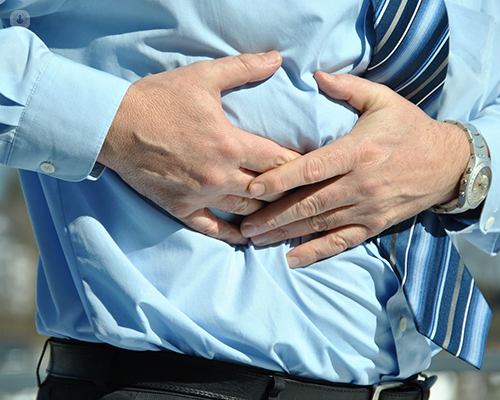Gallstones: An in-depth guide
Written in association with:Gallstones are a common condition that often require no treatment. However, sometimes gallstones can be extremely painful or have a range of different symptoms. In his latest article, renowned consultant general surgeon Mr Jawad Ahmad explains this condition in detail, including their causes, symptoms and treatment options.

What are gallstones?
Gallstones are a very common condition. If you go to a supermarket and scan all the ladies over the age of 40, you might be surprised to discover that nearly 1 in 5 have gallstones.
Gallstones are made in the gallbladder. Usually, bile is stored in the gallbladder, and sometimes it becomes thick, like mud. Then it is converted into sand-like particles, which turn into tiny stones that can become bigger over time. This is the most common way that gallstones form in the gallbladder.
Most of the time the gallstones do not require any treatment, and most patients don’t even know they have gallstones. Sometimes we scan patients for something else and we can see that they also have gallstones, but they aren’t giving the patient any trouble so treatment is not needed.
Patients do not need treatment until they are experiencing symptoms such as indigestion, feeling full in the upper abdomen, feeling sick or bloated, or diarrhoea. One of the main symptoms is the stone causing severe pain. Some people have said this is as painful as a heart attack.
Sometimes the gallstones can move into the pancreas causing pancreatitis. They can also cause jaundice or sepsis. So there are many different symptoms they can cause, but the majority of patients don’t experience these symptoms so surgery is not required.
At what size do gallstones need surgery?
The size of the stones does not matter. It only depends on what symptoms the stones are causing. If they are causing lots of bothersome symptoms that is when we operate.

What does gallstone surgery entail?
To treat gallstones, we have to remove the gallbladder. This is because if we remove only the stones the gallbladder will make more. It is a problem with absorption in the gallbladder, and this is why the stones are made. Gallbladders are also sometimes called the stone-making factory, so unless you remove the cause of the gallstones they will keep coming back.
We previously tried to use medicines to dissolve the stones, but nothing really worked. So surgery is considered the gold standard. It is a keyhole operation, with four little incisions on the abdomen, about half a centimetre in size. We can then remove the gallbladder with the stones, and they can go home four or five hours after the surgery. Sometimes patients need to stay a bit longer, but most can go home on the same day.
How serious is gallstone surgery?
Gallstone surgery is keyhole surgery, and it is also called laparoscopic cholecystectomy. It is a very common procedure, in the UK it is performed around 80,000 times per year. It is a very safe operation, especially if an expert is doing it. The risk of complications is very low if the surgeon is experienced in this procedure.
How long does it take to recover from the surgery?
Most patients can go home the same day as their laparoscopic gallbladder removal procedure. They usually do not require care and can be independent. Some will need to take painkillers for a few days following the surgery and some don’t need to take any at all. They may not be able to cook for themselves or do household chores, but they should be able to go upstairs and go to the toilet on their own.
At home, it can take up to one week to recover from all of the symptoms. They may have some nausea due to the anaesthesia, and some shoulder pain due for up to 48 hours due to the gas used during the surgery. After a week patients are usually fine. We tell them to take it easy for a couple more weeks and to gradually go back to eating and drinking normally, and driving.

What happens if gallstones are left untreated?
The majority of patients have no symptoms and do not require surgery. Some people get severe symptoms such as pain, jaundice, sepsis and pancreatitis, and in a very small percentage of people, it can be life-threatening. It is very rare, but some people do not survive if they are suffering from gallstones. These people are usually elderly and frail and suffer from other conditions as well.
If you are concerned about gallstones, you can book a consultation with Mr Ahmad today via his Top Doctors profile.



